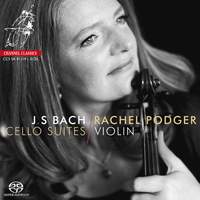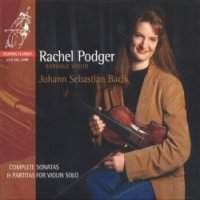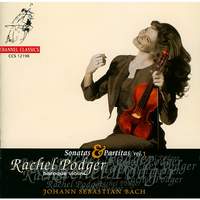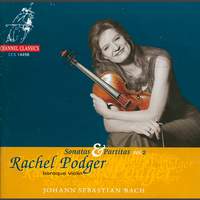Recording of the Week,
Rachel Podger plays the Bach Cello Suites
As Isabelle Faust’s glorious recent Bach album attests, Bach was an inveterate recycler of his own music, repurposing instrumental works for orchestral pieces and cantatas and vice versa according to the forces at hand, so on reflection I’ve a sneaking suspicion that today’s rather audacious Recording of the Week would have had his seal of approval. But when an email announcing violinist Rachel Podger’s plan to record the Bach Cello Suites landed in my inbox last year, I initially assumed it was a typo: though works like the Goldberg Variations and The Art of Fugue have been transcribed and recorded for everything from recorder ensemble to saxophone quartet, the Cello Suites have largely been regarded as sacrosanct. Viola-players, of course, get a special dispensation - Kim Kashkashian, Maxim Rysanov, Antoine Tamestit, and Lillian Fuchs are among those who’ve tackled some or all of the Suites on disc – but surely shifting them still further upward would be a bridge too far?
 It certainly takes a minute to settle into the new sound-world: reclothed in the brighter colours of D major, the opening Prelude of the ‘G major’ Suite shimmers with an unfamiliar, iridescent beauty that’s as disconcerting as it’s beguiling. Podger’s playing often encourages me to think in pictorial terms (as my review of her Four Seasons this time last year will attest), and here the effect is rather like seeing Mona Lisa with her dusky tints lifted several shades. But by the time I reached the Allemande, I’d entirely forgotten that I was listening to a transcription – as Yo-Yo Ma’s third and final recording of the Suites last year really underlined for me, there’s a purity about these works which seems to transcend the medium itself, and like many of my most treasured interpreters Podger never draws undue attention to the mechanics behind the music. She clearly knows and loves its every contour as well as any cellist (she’s coached these pieces for some years now, and relished playing them in private for even longer), and whilst she embraces the new sonorities which they acquire in her hands rather than attempting to replicate the colours of the originals there’s never any sense of the novelty-value being over-played.
It certainly takes a minute to settle into the new sound-world: reclothed in the brighter colours of D major, the opening Prelude of the ‘G major’ Suite shimmers with an unfamiliar, iridescent beauty that’s as disconcerting as it’s beguiling. Podger’s playing often encourages me to think in pictorial terms (as my review of her Four Seasons this time last year will attest), and here the effect is rather like seeing Mona Lisa with her dusky tints lifted several shades. But by the time I reached the Allemande, I’d entirely forgotten that I was listening to a transcription – as Yo-Yo Ma’s third and final recording of the Suites last year really underlined for me, there’s a purity about these works which seems to transcend the medium itself, and like many of my most treasured interpreters Podger never draws undue attention to the mechanics behind the music. She clearly knows and loves its every contour as well as any cellist (she’s coached these pieces for some years now, and relished playing them in private for even longer), and whilst she embraces the new sonorities which they acquire in her hands rather than attempting to replicate the colours of the originals there’s never any sense of the novelty-value being over-played.
From an interpretative point of view, she’s adept at making a virtue of necessity in several respects: gavottes, courantes and gigues are generally taken at a more fleet tempo than usual, though everything works so beautifully on its own terms that I only really registered this on referring back to some favourite cello recordings. Most importantly, everything dances: as she pointed out in a forthcoming interview with my colleague David, the Cello Suites have an almost folksy simplicity in comparison with the often very contrapuntal solo works for violin, and like Ma she never loses sight of the fact that Terpsichore is the driving force behind everything here. The gigues transfer particularly well to the violin, taking on an almost rustic quality in places - there are moments where her 1739 Pesarinius sounds for all the world like a fiddle cutting loose at a country dance.
There’s inevitably a trade-off for the additional brightness and agility that pays such dividends in the fast movements, and it’s perhaps in the sarabandes that one misses the unique melancholy quality of the cello: aside from the fundamental difference in timbre, there’s no getting away from the fact that the sound decays much more quickly on a violin, but Podger’s easy, unforced legato (and, if I’m not mistaken, some judicious additional double-stopping to paper over the cracks) provides ample compensation, and the sound blooms gorgeously in the lively acoustic of the Royal Academy of Music’s Angela Burgess Recital Hall.
The final suite, composed for a five-string instrument, poses its own special challenges to any string-player, and Podger’s solution here is adroit: she switches to the viola for the lower-lying phrases, and thanks to some extremely clever engineering and patching you’d be hard-pressed to spot the joins. Neither Podger nor I would advocate that you banish your Rostropovich, Casals or Fournier, but anyone who loves these endlessly rewarding works should give this recording a whirl.
Until 17th June we're offering up to 20% off Rachel Podger's recordings. (Please note that discounts do not apply to downloads).
Rachel Podger (violin)
Available Formats: 2 SACDs, MP3, FLAC, Hi-Res FLAC, Hi-Res+ FLAC
Rachel Podger (violin)
Available Format: 2 CDs
Rachel Podger (violin)
Available Formats: MP3, FLAC
Rachel Podger (violin)
Available Formats: MP3, FLAC






